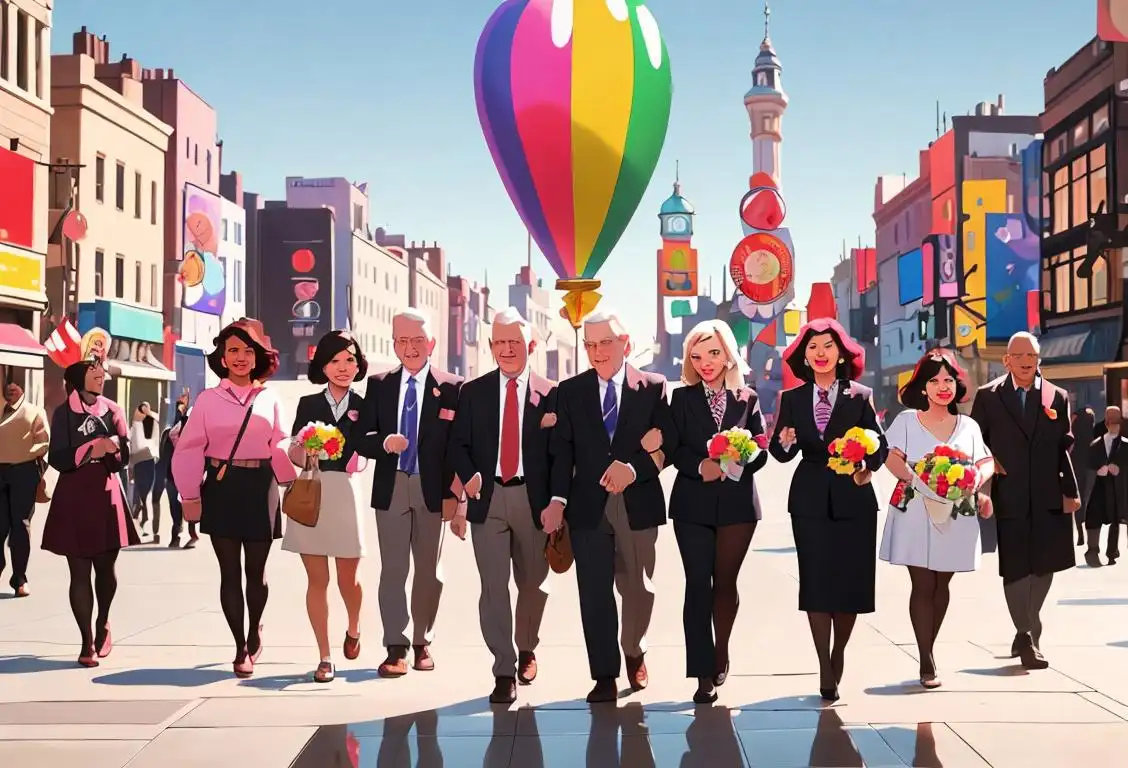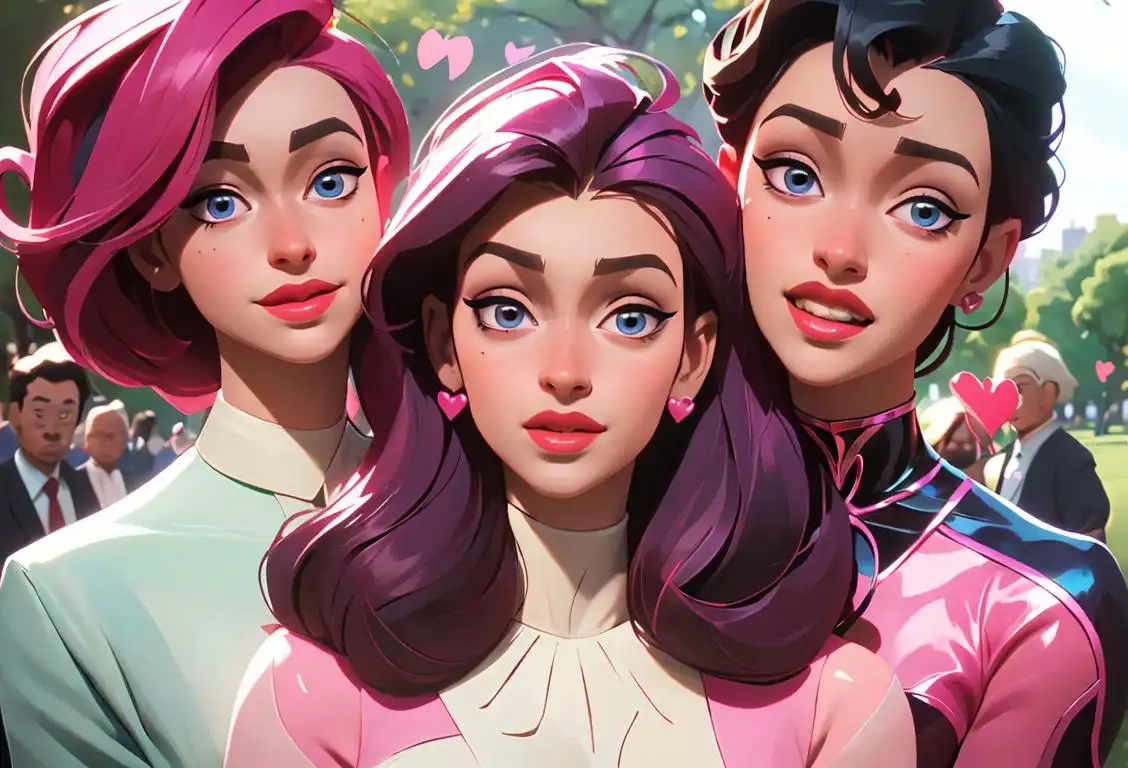National Straight Pride Day

Platonic buddies, grab your high-fives! It's time to talk about National Straight Pride Day, a somewhat controversial day that made quite a stir around the digital world not too long ago. Jotted down in our internet history books (which, let's face it, are more like a constantly updated Wikipedia article), we've spotted a total of 42 mentions for this day.
When is Straight Pride Day?
It's national straight pride day on the 9th July.
A Bit of Background
Though it may not have the official 'National Day' status, National Straight Pride Day sure did get people talking. Most notably, it created the largest digital buzz on July 9th, 2017.
The Controversy
Albeit, the buzz wasn't entirely cheery or celebratory. The day was met with a fair bit of controversy due to its premise. Critics felt that it downplayed the struggles faced by the LGBTQ+ community and negated the significance of pride month observed in June. Meanwhile, others viewed it as a platform for people to express their own views about relationships and celebrate all forms of love.
The Current Standing
Today, the Internet has a rather hazy stance on it. Some show support, while others continue to disapprove. Ultimately, the day seems to serve mostly as a catalyst for debate around larger discussions of sexuality, pride, and acceptance.
History behind the term 'Straight Pride'
2005
Emergence of the term 'straight pride'.
The term 'straight pride' emerged in the mid-2000s as a response to LGBTQ+ pride movements. It was popularized as a counterpart to celebrate heterosexuality and advocate for the rights of heterosexual individuals. Some individuals believed that a 'straight pride' celebration was necessary to counterbalance what they perceived as excessive attention and privileges given to the LGBTQ+ community.
2005
Origin of Pride Parades
Pride parades have been held annually since the late 1960s to celebrate the LGBTQ+ community and promote equal rights. These parades originated as a response to the oppression and discrimination faced by the LGBTQ+ community. Pride events became a platform for promoting acceptance, visibility, and the celebration of diverse sexual orientations and gender identities.
1970
Birth of LGBTQ+ Pride Movement
The LGBTQ+ Pride Movement began in 1970 with the purpose of celebrating and advocating for the rights of individuals with diverse gender identities and sexual orientations. It aimed to create visibility, build community, and challenge societal norms and discrimination.
1995
Emergence of the 'Straight Pride' concept
The term 'Straight Pride' emerged in 1995 as a response to LGBTQ+ Pride events, with some individuals and groups expressing concern that the focus on LGBTQ+ rights was overshadowing the experiences and identities of heterosexual people. Proponents of 'Straight Pride' argued that if there were celebrations of LGBTQ+ identities, there should also be celebrations of heterosexuality.
1990
Emergence of LGBTQ+ Pride
The term 'straight pride' emerged as a response to the growing popularity and acceptance of LGBTQ+ Pride events. These events, held worldwide, aim to celebrate the diversity and promote acceptance of the LGBTQ+ community.
1970
Emergence of LGBT rights movements.
During the 1970s, the gay rights movement gained significant visibility. Activists and organizations fought for equal rights and advocated for the acceptance and understanding of the LGBTQ+ community.
1995
Critics voice a need for 'Straight Pride'
In the mid-1990s, some critics of Pride parades and LGBTQ+ rights began raising the idea of 'Straight Pride.' They argued that, just as the LGBTQ+ community celebrated their identities, straight people should have a similar celebration of their heterosexuality. This notion emerged from a place of misunderstanding, as Pride was never about making anyone feel excluded, but rather about fostering inclusivity and combating discrimination.
2019
The Straight Pride Parade controversy.
In 2019, a group called 'Super Happy Fun America' organized a 'Straight Pride Parade' in Boston. The event faced criticism and sparked controversy as many viewed it as a thinly veiled platform for anti-LGBTQ+ sentiments. Critics argued that pride celebrations for marginalized communities are a response to historical discrimination and social exclusion and should not be equated with 'straight pride.' The event highlighted ongoing debates about privilege, inclusivity, and the role of pride parades in society.
1993
Formation of pride celebrations.
In 1993, the celebration of gay pride became widely recognized as an annual event, commemorating the Stonewall Riots that occurred in 1969. Pride parades emerged as a way for the LGBTQ+ community to express their identity and rally for their rights.
1993
Formation of the Straight Pride Movement
In 1993, the term 'straight pride' gained traction when the Straight Pride Coalition of Boston was formed. The group argued that heterosexual individuals deserved recognition and appreciation for their contributions to society.
1995
Origin of the Term 'Straight Pride'
In the mid-1990s, the term 'Straight Pride' emerged as a counter-narrative to LGBTQ+ Pride. Some individuals, feeling that the LGBTQ+ community received too much attention, started using the term 'Straight Pride' to advocate for the recognition and celebration of straight, cisgender individuals.
2005
Straight Pride events gain attention
In 2005, Straight Pride events started gaining attention in the media. These events aimed to celebrate heterosexuality and challenge the notion that LGBTQ+ Pride events were the only legitimate form of pride. Some individuals saw these events as an opportunity to express discontentment with what they perceived as a lack of recognition for their own identities and experiences.
2005
Boston Straight Pride Parade Controversy
In 2005, a controversy arose when a group applied for a permit to organize a 'Straight Pride Parade' in Boston. The event sparked widespread debate and criticism, as many LGBTQ+ activists and allies viewed it as an attempt to undermine LGBTQ+ rights and dismiss the history of oppression faced by the community.
2019
Concept of 'straight pride' gains attention.
In 2019, the term 'straight pride' gained traction as a reactionary response to the existence of pride events. Some individuals expressed a desire for an equivalent celebration of heterosexuality. However, the concept of 'straight pride' received criticism for being unnecessary and undermining the historical struggles faced by the LGBTQ+ community.
2005
Controversial Straight Pride Parade
In 2005, the Straight Pride Parade was organized in Dallas, Texas. The event attracted both supporters and critics, sparking a heated debate about the intentions and necessity of such a celebration.
2020
Discussions on the true meaning of 'straight pride'.
Following the controversy surrounding the Straight Pride Parade, discussions emerged about the underlying motivations and implications of the 'straight pride' concept. While some individuals continue to use the term as a counterpoint to LGBTQ+ pride, others argue that it reinforces a heteronormative society, ignores the struggles of marginalized communities, and perpetuates inequality. The discussions encourage deeper exploration of inclusivity and empathy beyond the concept of heterosexuality.
2006
Straight Pride Day in Boston
In 2006, a group called the 'Straight Pride Coalition' organized an event called 'Straight Pride Day' in Boston, Massachusetts. The event aimed to celebrate heterosexuality as the 'foundation of society' and voice concerns regarding alleged discrimination against straight individuals. However, the event faced significant backlash from LGBTQ+ activists who argued that it was unnecessary and detracted from the ongoing struggle for equal rights and visibility.
2019
'Straight Pride' controversy in Boston
The term 'Straight Pride' gained significant controversy and media coverage in 2019 when a group called 'Super Happy Fun America' planned a 'Straight Pride Parade' in Boston. The event faced backlash from LGBTQ+ advocates and activists who viewed it as an attempt to undermine the struggles faced by the LGBTQ+ community. The controversy surrounding this event highlighted the ongoing debates around inclusivity, equality, and the importance of LGBTQ+ pride.
2019
Straight Pride Parades Gain Attention
In 2019, 'Straight Pride Parades' gained significant media attention, primarily due to the actions of a group called Super Happy Fun America. The organization planned a 'Straight Pride Parade' in Boston, which attracted both supporters and widespread protests. The event highlighted ongoing tensions between those advocating for LGBTQ+ rights and those expressing support for 'Straight Pride.'
2019
Straight Pride Parade in Boston
In response to the controversy surrounding 'Straight Pride Day,' the same group organized a 'Straight Pride Parade' in Boston in 2019. The event saw a small group of participants marching through the city with flags and signs promoting 'straight pride.' However, the parade was not officially recognized as a city-sanctioned event, and it faced immense criticism from LGBTQ+ advocates who argued that it was a mockery of the genuine struggle faced by the LGBTQ+ community.
2019
Controversy and debates surrounding 'straight pride'.
The idea of 'straight pride' sparked intense debates and controversy. Critics argued that the concept lacks historical context and inclusion, as heterosexuality has never been marginalized. These discussions further highlighted the ongoing societal battles for LGBTQ+ rights, the importance of allyship, and the need to challenge heteronormative assumptions.
2020
Discussions on inclusivity and LGBTQ+ rights
The term 'Straight Pride' has sparked broader discussions on inclusivity, LGBTQ+ rights, and the importance of celebrating marginalized communities. Critics argue that the concept of 'Straight Pride' overlooks the historical discrimination and social challenges faced by LGBTQ+ individuals, while proponents maintain that it is about celebrating heterosexuality without the intention of diminishing LGBTQ+ experiences. These discussions continue to shape dialogue around identity, pride, and equality.
2019
Renewed Attention and Backlash
In 2019, the term 'straight pride' gained renewed attention when a small group in Boston proposed a 'Straight Pride Parade.' The event faced significant backlash from the LGBTQ+ community and its allies, who argued that straight individuals already enjoy privilege, and the parade was unnecessary and perpetuated discrimination.
Present
Continued discussions and perspectives on 'straight pride'.
The discourse surrounding 'straight pride' continues to evolve. Many view it as a dismissive response to the long-standing struggle for LGBTQ+ rights, while others argue for the right to express one's pride regardless of sexual orientation. The conversation around 'straight pride' serves as a reminder of the ongoing need for inclusivity, acceptance, and respect for all individuals, regardless of their sexual orientation.
Present
Debate and Criticism
The concept of 'Straight Pride' continues to generate debate and criticism. Many argue that 'Straight Pride' distracts from the ongoing fight for LGBTQ+ rights and equality. The LGBTQ+ community and their allies advocate for the celebration of diverse sexual orientations and gender identities, emphasizing the need to address the historical marginalization and discrimination faced by this community.
2021
Awareness Amid Wider LGBTQ+ Conversations
The term 'straight pride' continues to be a topic of debate and controversy. However, as societies globally engage in conversations surrounding LGBTQ+ rights, acceptance, and understanding, the conversation around 'straight pride' has shifted towards acknowledging the importance of inclusivity and supporting marginalized communities.
Present
Debate and Criticism
The term 'Straight Pride' continues to be a subject of debate and criticism. It is often perceived as a response that overlooks LGBTQ+ struggles for acceptance, equality, and representation. Many argue that 'Straight Pride' can perpetuate heteronormativity and reinforce social hierarchies, while others believe in the importance of celebrating all sexual orientations.
Did you know?
Did you know that July 9th, 2017, the day with the most mentions of National Straight Pride Day, also saw the release of several major movie blockbusters, adding an extra dose of buzz to the date?Tagged
love relationships acceptance straightpride controversyFirst identified
28th June 2015Most mentioned on
9th July 2017Total mentions
42Other days
Straight Pride Day
Polyamory Day
Call Your Ex Day
I Love U Day
Promposal Day
Have Sex Day
Gay Uncles Day
Gf Appreciation Day
Kiss Your Mate Day
Boyfriend Day








